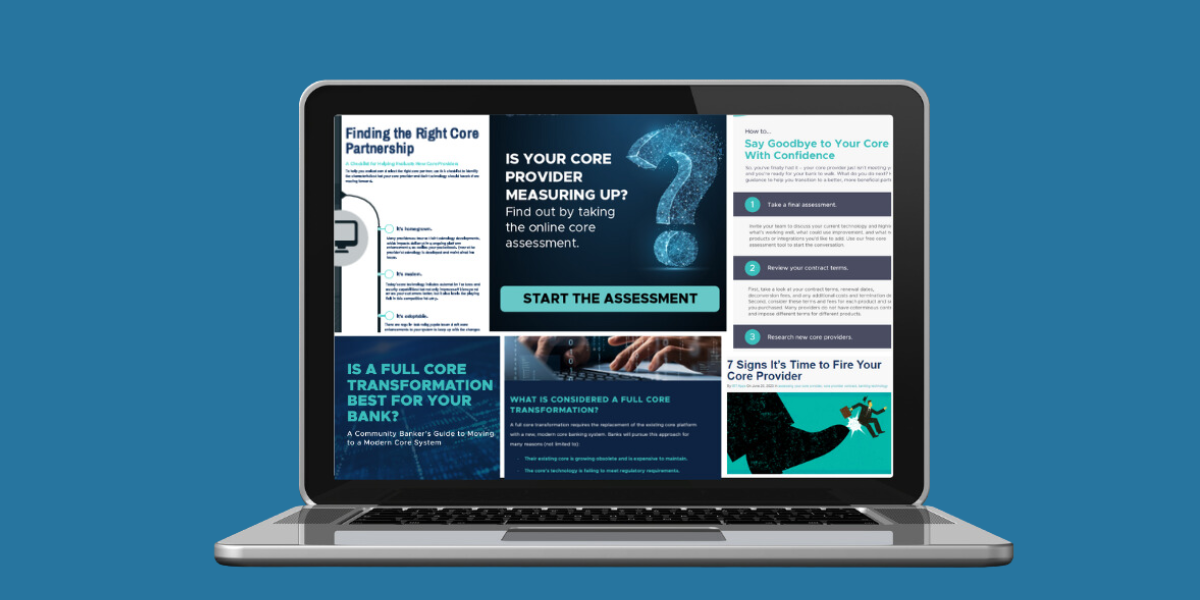When banks are selecting a new core provider and find themselves comparing smaller and larger cores, it is likely that the smaller core providers often get the bench. As with many products and services, consumers tend to gravitate towards the biggest names on the market. Their website, advertising, and variety of offerings have consumers believing that what they're selling must be impeccable and that there’s no chance they’ll sell or go under because of their sheer size.
But in peeling back the layers, banks will find that large providers may not deliver the service and support as expected for what they’re paying. There are many reasons why it’s better to consider working with a smaller core provider, so let’s dig in to a few truths and one common misconception.
Truth #1
The top smaller core providers have both industry AND technology expertise.
Finding a legacy provider that possesses both industry and banking technology expertise is like expecting a major retailer like Walmart to offer concierge service. Larger providers are either composed of 1.) Experienced bankers who outsource development through acquisition or 2.) Technology connoisseurs that develop the slickest products, but lack the banking knowledge needed to truly serve their client base.
Having a core provider that has both banking and technology expertise is critical. Not only can this type of provider offer products that are innovative and beneficial to your business, but they also have a background in banking and know what your bank needs to operate efficiently and maintain compliance.
Truth #2
A core partnership should be based on service and not on the transaction.
Over the years, the core provider relationship with a community bank has migrated from a service approach to a transaction-based one, where providers are prioritizing the sale over the client. Promises are made upfront that are rarely fulfilled, service and support are subpar, delivery times run longer than expected, and costs continue accruing during and after conversion. Even worse, support is likely not in-house, which means your bank may be waiting a few days for a response to a simple ticket item.
But not all cores are alike. Smaller core providers pride themselves on their ability to serve. Just as you serve your community, smaller providers see themselves as a partner in helping you run and grow your business. In fact, this service-based relationship and core partnership starts even before signing the contract and doesn’t end at conversion.
How is it possible to start a partnership before signing a contract?
Take a look at our Vendor Management in Action article with Gilmer National Bank. A great core provider gives your bank what it needs during the due diligence process, so it can make the best core decision. This not only includes being responsive to your bank’s requests; it’s also providing honest, transparent communication during the proposals and contract negotiations process. The way your bank is treated before signing the dotted line is an indication of the partnership in the long-term.
Truth #3
Smaller providers develop and deliver products your bank knows how to use and continues to use long-term.
“Legacy systems have so much technical debt because their products aren’t able to service their client base and are incapable of adapting to a changing climate,” says Mark Dittman, CEO, IBT Apps.
Many providers develop a system that is one-size-fits most, so it may seem to work for the bank’s needs at first, but as years go by, goals change, technology advances, and customers demand new and faster products. These legacy systems are often not equipped to scale, and with cybersecurity crime on the rise, these systems cannot keep up with security updates. What’s the end result? Performance starts tanking, yet your bank is still paying.
Smaller core providers understand that core systems are a huge investment and because they are the “core” of your business, your systems need routine attention to continue adding value for your bank. These core providers work to improve and update their products and services using a diligent software enhancements process, where they seek input from bankers to prioritize technology developments, select enhancements based on a client vote, and deliver them back to the client base at no charge. Not only does this process make a bank’s voice heard, but it ensures that a bank’s core system can scale to fit a need and that its performance can remain optimal and secure regardless of the climate.
The Lie
Smaller cores have a high risk of acquisition.
We can’t promise that a smaller core won’t ever be acquired in their lifetime. However, the chances of a legacy core sunsetting their product is more likely. In fact, Fintech providers like Temenos, FIS, Jack Henry, and, the latest, Finastra have a track record of sunsetting their core systems and providing their customers with little notice before sunsetting the core system, leaving bankers to quickly find another solution, or get shuffled to another one of the provider's systems as their only other option.
No matter the size, there is always a risk in selecting a core provider. However, if there is a concern that a smaller core provider may be acquired, then be sure your bank asks what the succession plan looks like and ask them directly if acquisition is in their 10-year plan. A trusted provider will share their business goals. Chances are, however, that if the provider has a great reputation as a core partner, has development and support teams under one umbrella, and is constantly working at improving its products and services, that acquisition is not in the cards. Too many core acquisitions do not enhance the systems at play and do not work in the best interest of the banks.
Facing the Sunset
Many banks are facing a “core challenge.” They’ve been on their legacy core system for 20+ years and either the wheels are falling off the cart or its performance is average, but there’s no opportunity to expand offerings or make enhancements. The risks continue to build, and if the system doesn’t break down suddenly or have a security breach, then it's highly likely the provider will at some point sunset the product. Usually, if the provider sunsets the product, the bank is on its own to figure out the next steps.
While this situation could be avoided by evaluating a modern core technology system proactively, facing a sunset is no need for panic. In fact, it should be looked at as an opportunity for a bank to work with a new core provider that not only serves the bank, but also serves generations of customers with what they need when they need it. Whether or not your bank’s core system is being sunsetted, consider giving smaller, alternative core providers a chance; they may just be a better fit for your bank.
----
IBT Apps is a small core provider that has an ongoing commitment to community banks. As your core partner, we provide the technology and support to evolve your business, so you can elevate your customers’ banking experience. We always put your business first, so you can deliver service with confidence.
Have questions about your core options? Interested in seeing a demo? Connect with our team.






